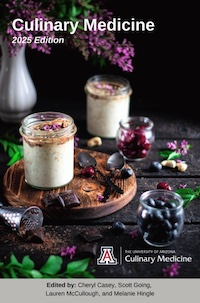
|
FreeComputerBooks.com
Links to Free Computer, Mathematics, Technical Books all over the World
|
|
- Title: Culinary Medicine
- Author/Editor(s) Cheryl Casey, et al.
- Publisher: University of Arizona (2025); eBook (Creative Commons Licensed)
- License(s): Creative Commons License (CC)
- Hardcover/Paperback: N/A
- eBook: PDF, ePub, and Read Online
- Language: English
- ISBN-10: N/A
- ISBN-13: N/A
- Share This:

|
Imagine unlocking the secrets of culinary medicine, where nourishing the body becomes an art form and a pathway to vibrant wellness. Discover a comprehensive guide to mastering culinary medicine and elevating health to new heights.
About the Authors- N/A
 Similar Books:
Similar Books:
-
 The Mediterranean Way of Eating (John J.B. Anderson, et al.)
The Mediterranean Way of Eating (John J.B. Anderson, et al.)
This book offers evidence-based information about an enjoyable, healthy way of eating that has stood the test of time, along with practical suggestions for incorporating the Mediterranean diet into your daily life.
-
 Routledge Handbook of Chinese Medicine (Vivienne Lo, et al.)
Routledge Handbook of Chinese Medicine (Vivienne Lo, et al.)
This book is an extensive, interdisciplinary guide to the nature of traditional medicine and healing in the Chinese cultural region, and its plural epistemologies. It will be of interest to practitioners, patients and specialists, etc.
-
 Nutrition: Science and Everyday Application (Alice Callahan, et al.)
Nutrition: Science and Everyday Application (Alice Callahan, et al.)
What comes to mind when you think of food? What does it mean to you? This book helps readers develop the scientific understanding to support their personal and professional decisions.
-
 The Body Code: Unlocking Your Body's Ability to Heal Itself
The Body Code: Unlocking Your Body's Ability to Heal Itself
A powerful new approach to natural, intuitive whole-body healing. Heal yourself in body and mind. A road map to healing based in deep study of the human body, time-proven ancient practices, and the unlimited power of the subconscious mind.
-
 Ancient China: A History (John S. Major, et al)
Ancient China: A History (John S. Major, et al)
This book is a comprehensive and accessible textbook that helps students understand the key themes of world history within a chronological framework stretching from ancient times to the present day.
-
 China: 5,000 Years Innovation and Transformation in the Arts
China: 5,000 Years Innovation and Transformation in the Arts
Archaeology is constantly rewriting the story of China's artistic development as yet more magnificent objects are dug from its soil. This huge book covers many recently discovered artifacts that have revolutionized the study of Chinese art.
-
 Can Biotechnology Abolish Suffering? (David Pearce)
Can Biotechnology Abolish Suffering? (David Pearce)
The essays deal with the abolition of suffering through biotechnology, negative utilitarianism, our obligations toward non-human animals, the nature of consciousness, and the future of intelligent life.
-
 Essentials of Genetics (Heidi Chial, et al.)
Essentials of Genetics (Heidi Chial, et al.)
This book is a brief guide through the core concepts of how genes are structured and how they drive biological diversity, can be used as a guide for introductory biology students, a reference, or a self-guided exploration for general science enthusiasts.
-
 DNA Replication and Human Disease (JMelvin L. DePamphilis )
DNA Replication and Human Disease (JMelvin L. DePamphilis )
With only two exceptions, the genome is replicated once and only once each time a cell divides. How is this feat accomplished? What happens when errors occur? This book addresses these questions by presenting a thorough analysis of the molecular events.
-
 RNA, the Epicenter of Genetic Information (John Mattick, et al)
RNA, the Epicenter of Genetic Information (John Mattick, et al)
Documents the confused early history of DNA, RNA and proteins - a transformative history of molecular biology like no other. Integrates the influences of biochemistry and genetics on the landscape of molecular biology.
-
 Genomes (Terence A. Brown)
Genomes (Terence A. Brown)
This book covers modern molecular genetics from the genomics perspective, including the sequencing of the human genome, characterization of genome expression and replication processes, and transcriptomics and proteomics.
-
 Human Physiology (Wikibooks)
Human Physiology (Wikibooks)
It provides an introductory explanation of the workings of the human body, with an effort to draw connections between the body systems and explain their interdependencies. The focus is homeostasis and how the body maintains balance within each system.
-
 Mind, Body, World: Foundations of Cognitive Science
Mind, Body, World: Foundations of Cognitive Science
Intended to introduce the foundations of cognitive science, this book addresses a number of questions currently being asked by those practicing in the field of cognitive science. It highlights the fundamental tensions and lines of fragmentation of cognitive science.
-
 Mind Hacking: How to Change Your Mind for Good in 21 Days
Mind Hacking: How to Change Your Mind for Good in 21 Days
Teaches you how to reprogram your thinking - like reprogramming a computer - to give you increased mental efficiency and happiness. Learn to take charge of your mind and banish negative thoughts, habits, and anxiety - in just 21 days!
-
 Paths: Why is Life Filled with so many Detours?
Paths: Why is Life Filled with so many Detours?
This book explores the amazing similarity between paths taken by people and many other things in life, and its impact on the way we live, teach and learn. Offering insights into the new scientific field of paths as part of the science of networks, etc.
-
 A Companion to Digital Humanities (Susan Schreibman, et al)
A Companion to Digital Humanities (Susan Schreibman, et al)
This book is focusing on the experience of particular disciplines in applying computational methods to humanities research problems; the basic principles of humanities computing across applications and disciplines; specific applications and methods; and production, dissemination, and archiving.





